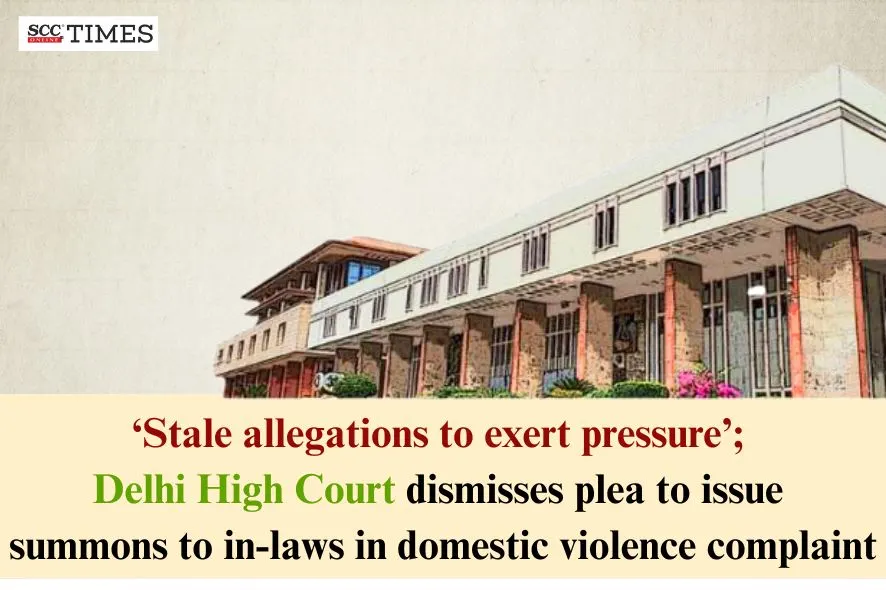Delhi High Court: The petitioner-wife filed the present petition under Section 528 of the Bharatiya Nagarik Suraksha Sanhita, 2023 (‘BNSS’) read with Section 482 of the Criminal Procedure Code, 1973 (‘CrPC’) for quashing the orders of the Trial Court and the Appellate Court, which upheld the Trial Court’s order, whereby the names of in-laws were deleted from the array of parties when omnibus allegations were mentioned against them. A Single Judge Bench of Manmeet Pritam Singh Arora*, J., opined that no interference was warranted when non-summoning and deletion of parties was done due to lack of specific allegations against them in the complaint filed under Section 12 of the Protection of Women from Domestic Violence Act, 2005 (‘DV Act’).
Background
The marriage between parties was solemnized in 2001 and lot of gifts as demanded by the in-laws at that time were given by the petitioner’s parents. It was alleged that the in-laws passed unwarranted remarks on her appearance, abused her when she touched feet of her father-in-law, and showed resentment against her post giving birth to a girl child. It was further alleged that her mother-in-law deprived her of even the basic needs and did not allow her to use money from Respondent 2-her husband’s earnings.
The wife contended that the husband slapped her and that in-laws used abusive language against her routinely. Even when the wife had her gall bladder surgery, the husband and the in-laws offered her no help and later, the wife and the husband shifted to another house. The wife aggrieved by the said acts of domestic violence, filed a complaint under Section 12 of the DV act before the Trial Court against her husband, parents-in-law and her brother-in-law and his wife.
The Trial Court vide order dated 2-2-2023, held that there was no domestic relationship between wife and the in-laws, as the parties, i.e., the husband and the wife, were residing in a separate property and had established a separate household, therefore, the Trial Court deleted them from the array of parties. Thereafter, the wife filed an appeal under Section 29 of the DV Act against the order dated 2-2-2023, which was dismissed by the Appellate Court, thereby affirming the view taken by the Trial Court.
Analysis, Law and Decision
The Court observed that the allegations of harassment and violence enlisting specific incidents have been made substantially against the husband while allegations against the in-laws were allegations of taunts and demand of gifts.
It was also observed that in the complaint there were no specific dates given by the wife against the alleged acts of brother-in-law neither there was any specific incident pleaded in the complaint against the wife of the brother-in-law. Both brother-in-law and his wife were admittedly living in a separate household on a distinct floor of the property since 2013.
The Court noted, that in the facts of the present case, the complaint alleging domestic violence had been filed after 21 years of marriage and after 9 years since wife last resided with the in-laws. These allegations in addition to being stale, appeared to have been made with an intent to rope in the relatives to exert pressure on husband to provide the wife and her daughter with maintenance and alternate residence. However, there were no specific averments in the complaint except the said demands against the deleted array of parties.
The Court relied upon the decision of Supreme Court in Kamal v. State of Gujarat, Crl.A. No. 2042 of 2025, wherein while quashing the FIR filed under Section 498-A of the Penal Code, 1860, the Supreme Court held that such allegations of taunts could not justify initiation of criminal proceedings against the relatives including parent-in-laws in a matrimonial discord. The Court also relied on Geddam Jhansi v. State of Telangana, 2025 SCC OnLine SC 263, and opined that the Trial Court and the Appellate Court deleting Respondent 3-mother-in-law, who was on death bed, and Respondent 6-brother-in-law’s wife, who was residing in separate household since 2013, from the array of the parties was justified and did not need interference.
The Court opined that the husband and wife and the in-laws were residing separately, thus, there was no present and continuing threat of domestic violence. Therefore, the Court stated it to be relevant consideration justifying non-issuance of summons to the in-laws. The Court further stated that the specific incidents pleaded in the complaint against the husband had already resulted in initiation of criminal proceedings against him and the reliefs sought in the complaint were being pursued against husband and being heard by the Trial Court. Thus, the Trial Court’s order deleting in-laws from the array of parties required no interference.
Accordingly, the Court dismissed the petition as the wife failed to show any infirmity in the impugned orders deleting Respondents 3, 5, and 6 from the array of parties.
[X v. State (NCT of Delhi), 2025 SCC OnLine Del 4662, decided on 3-7-2025]
*Judgement authored by- Manmeet Pritam Singh Arora
Advocates who appeared in this case:
Advocate for Petitioner- L.M. Grover, Advocate (Through VC)
Advocate for Respondents- Yasir Rauf Ansari, ASC (Crl); Alok Sharma, Jyotsana Pandit, Advocates; Roshan Lal Saini, Advocate for Respondents 2 to 6 (Through VC)


